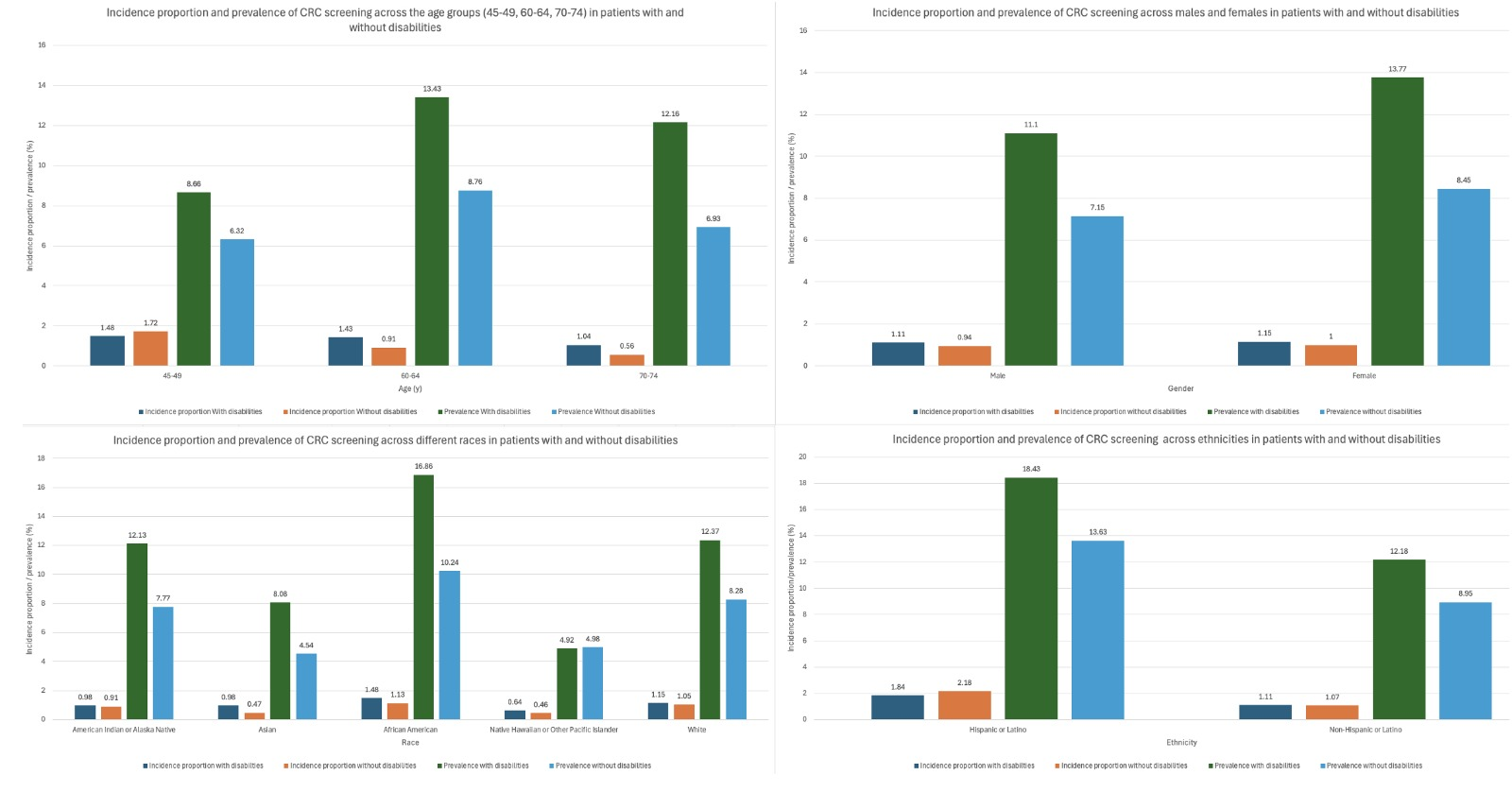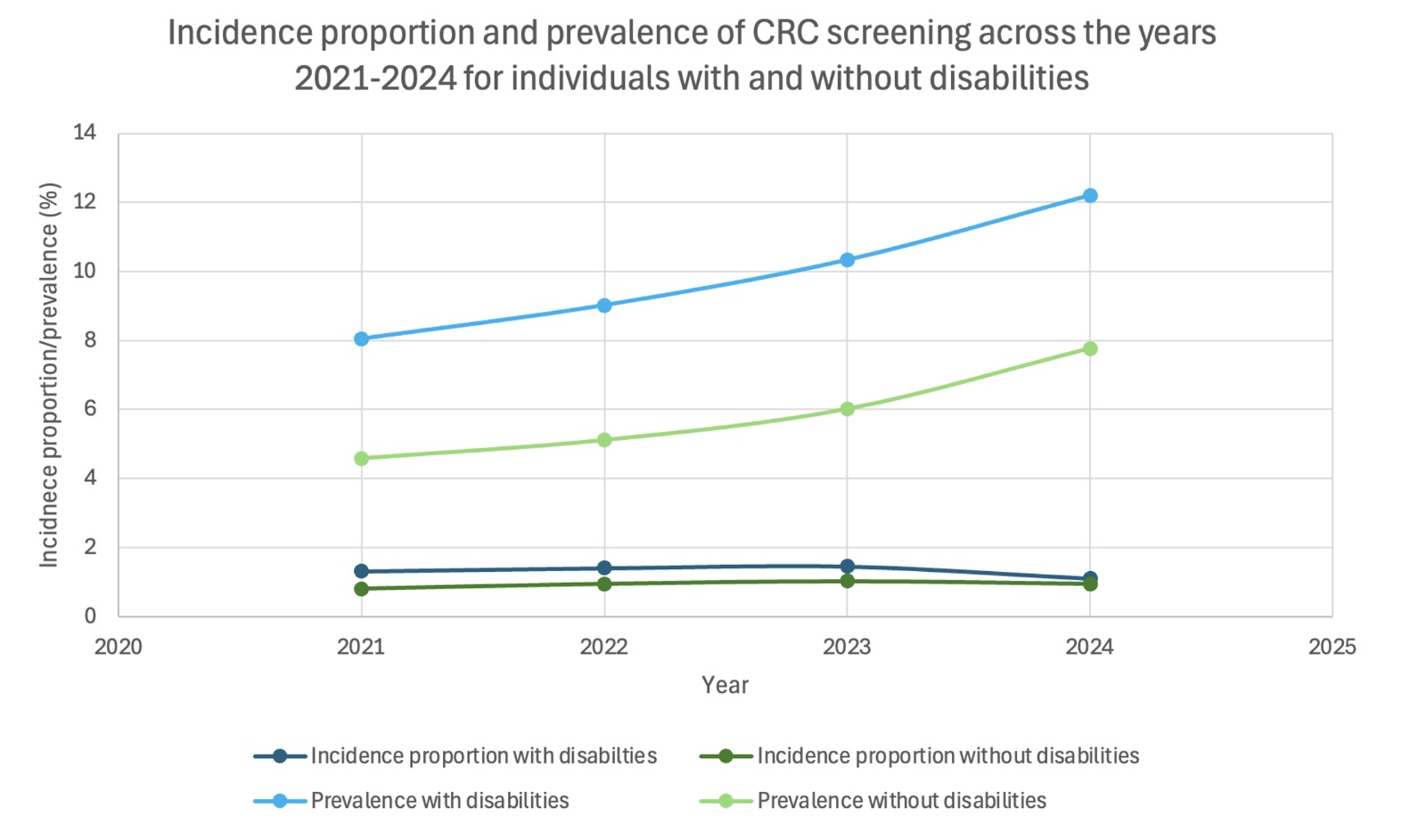Monday Poster Session
Category: Colorectal Cancer Prevention
P2608 - Disparities in Colorectal Cancer Screening Among Adults With and Without Disabilities: A Stratified Analysis
Monday, October 27, 2025
10:30 AM - 4:00 PM PDT
Location: Exhibit Hall

Amer Arman, MD
MedStar Health
Detroit, MI
Presenting Author(s)
Omar Arman, MD, MPH1, Noor Arman, MD2, Zeid Jarrar, MD2, Amer Arman, MD3, Hebah Jaber, MD4, Khaled Rafeh, MD5, Omar Daas, MD2, Mazen Zamzam, BS6, Jad Bou-Abdallah, MD1
1University at Buffalo, Buffalo, NY; 2University of Jordan School of Medicine, Amman, 'Amman, Jordan; 3MedStar Health, Washington, WA; 4Mutah University, Mutah, Al Karak, Jordan; 5School of Medicine, The University of Jordan, Shmeisani, 'Amman, Jordan; 6Oakland University William Beaumont School of Medicine, Royal Oak, MI
Introduction: Colorectal cancer (CRC) screening is crucial for prevention, yet disparities persist among disabled individuals. This study evaluates trends in CRC screening incidence, prevalence, and incidence rates between disabled and non-disabled cohorts from 2021 to 2024.
Methods: We conducted a retrospective analysis using TriNetX data for patients aged 45–75. Two cohorts were identified: disabled (n=722,574; ICD-10 codes) and non-disabled (n=19,317,514). CRC screening was measured using CPT codes for colonoscopy, sigmoidoscopy, and fecal occult blood tests. We analyzed trends in incidence, prevalence, and stratified results by age, gender, race, and ethnicity.
Results: Disabled individuals consistently demonstrated higher CRC screening prevalence and incidence across all years (Figure 1). However, incidence dropped in both cohorts in 2024, with disabled individuals declining from 1.45% to 1.10%, compared to a drop from 1.03% to 0.95% in non-disabled individuals. Prevalence steadily increased throughout the study period, with disabled individuals maintaining significantly higher rates (12.2% in 2024 vs. 7.8% in the non-disabled cohort). Stratified analyses revealed disparities across demographics (Figure 2): incidence was highest in the 45–49 age group and lowest in the 70–74 group for both cohorts, while prevalence peaked in the 60–64 group. Females had higher screening rates than males. African Americans and Hispanics demonstrated the highest prevalence and incidence, though disabled Hispanic individuals had lower incidence rates than their non-disabled counterparts. Asians and Native Hawaiians consistently had the lowest CRC screening rates
Discussion: The steady increase in prevalence highlights the cumulative nature of CRC screening, while the 2024 decline in incidence, particularly among disabled individuals, may reflect healthcare access barriers, saturation of previously screened populations, or incomplete data. Logistical challenges, limited mobility, and systemic inequities likely contribute to these disparities, emphasizing the need for tailored public health interventions. Although CRC screening rates have remained higher among disabled individuals, new screenings declined in 2024. These findings highlight the need for equitable access, particularly for disabled individuals, males, older adults, and underrepresented racial and ethnic groups. Expanding disability-specific policies and targeted outreach efforts is critical to reducing disparities in preventive care.

Figure: Figure 1: shows incidence proportion (%) and prevalence (%) of CRC screening among individuals with and without disabilities for the years 2021-2024

Figure: Figure 2: shows incidence proportion (%) and prevalence (%) of CRC screening in individuals with and without disabilities across age groups (only 3 shown for brevity), gender, races, and ethnicities in the year 2024
Disclosures:
Omar Arman indicated no relevant financial relationships.
Noor Arman indicated no relevant financial relationships.
Zeid Jarrar indicated no relevant financial relationships.
Amer Arman indicated no relevant financial relationships.
Hebah Jaber indicated no relevant financial relationships.
Khaled Rafeh indicated no relevant financial relationships.
Omar Daas indicated no relevant financial relationships.
Mazen Zamzam indicated no relevant financial relationships.
Jad Bou-Abdallah indicated no relevant financial relationships.
Omar Arman, MD, MPH1, Noor Arman, MD2, Zeid Jarrar, MD2, Amer Arman, MD3, Hebah Jaber, MD4, Khaled Rafeh, MD5, Omar Daas, MD2, Mazen Zamzam, BS6, Jad Bou-Abdallah, MD1. P2608 - Disparities in Colorectal Cancer Screening Among Adults With and Without Disabilities: A Stratified Analysis, ACG 2025 Annual Scientific Meeting Abstracts. Phoenix, AZ: American College of Gastroenterology.
1University at Buffalo, Buffalo, NY; 2University of Jordan School of Medicine, Amman, 'Amman, Jordan; 3MedStar Health, Washington, WA; 4Mutah University, Mutah, Al Karak, Jordan; 5School of Medicine, The University of Jordan, Shmeisani, 'Amman, Jordan; 6Oakland University William Beaumont School of Medicine, Royal Oak, MI
Introduction: Colorectal cancer (CRC) screening is crucial for prevention, yet disparities persist among disabled individuals. This study evaluates trends in CRC screening incidence, prevalence, and incidence rates between disabled and non-disabled cohorts from 2021 to 2024.
Methods: We conducted a retrospective analysis using TriNetX data for patients aged 45–75. Two cohorts were identified: disabled (n=722,574; ICD-10 codes) and non-disabled (n=19,317,514). CRC screening was measured using CPT codes for colonoscopy, sigmoidoscopy, and fecal occult blood tests. We analyzed trends in incidence, prevalence, and stratified results by age, gender, race, and ethnicity.
Results: Disabled individuals consistently demonstrated higher CRC screening prevalence and incidence across all years (Figure 1). However, incidence dropped in both cohorts in 2024, with disabled individuals declining from 1.45% to 1.10%, compared to a drop from 1.03% to 0.95% in non-disabled individuals. Prevalence steadily increased throughout the study period, with disabled individuals maintaining significantly higher rates (12.2% in 2024 vs. 7.8% in the non-disabled cohort). Stratified analyses revealed disparities across demographics (Figure 2): incidence was highest in the 45–49 age group and lowest in the 70–74 group for both cohorts, while prevalence peaked in the 60–64 group. Females had higher screening rates than males. African Americans and Hispanics demonstrated the highest prevalence and incidence, though disabled Hispanic individuals had lower incidence rates than their non-disabled counterparts. Asians and Native Hawaiians consistently had the lowest CRC screening rates
Discussion: The steady increase in prevalence highlights the cumulative nature of CRC screening, while the 2024 decline in incidence, particularly among disabled individuals, may reflect healthcare access barriers, saturation of previously screened populations, or incomplete data. Logistical challenges, limited mobility, and systemic inequities likely contribute to these disparities, emphasizing the need for tailored public health interventions. Although CRC screening rates have remained higher among disabled individuals, new screenings declined in 2024. These findings highlight the need for equitable access, particularly for disabled individuals, males, older adults, and underrepresented racial and ethnic groups. Expanding disability-specific policies and targeted outreach efforts is critical to reducing disparities in preventive care.

Figure: Figure 1: shows incidence proportion (%) and prevalence (%) of CRC screening among individuals with and without disabilities for the years 2021-2024

Figure: Figure 2: shows incidence proportion (%) and prevalence (%) of CRC screening in individuals with and without disabilities across age groups (only 3 shown for brevity), gender, races, and ethnicities in the year 2024
Disclosures:
Omar Arman indicated no relevant financial relationships.
Noor Arman indicated no relevant financial relationships.
Zeid Jarrar indicated no relevant financial relationships.
Amer Arman indicated no relevant financial relationships.
Hebah Jaber indicated no relevant financial relationships.
Khaled Rafeh indicated no relevant financial relationships.
Omar Daas indicated no relevant financial relationships.
Mazen Zamzam indicated no relevant financial relationships.
Jad Bou-Abdallah indicated no relevant financial relationships.
Omar Arman, MD, MPH1, Noor Arman, MD2, Zeid Jarrar, MD2, Amer Arman, MD3, Hebah Jaber, MD4, Khaled Rafeh, MD5, Omar Daas, MD2, Mazen Zamzam, BS6, Jad Bou-Abdallah, MD1. P2608 - Disparities in Colorectal Cancer Screening Among Adults With and Without Disabilities: A Stratified Analysis, ACG 2025 Annual Scientific Meeting Abstracts. Phoenix, AZ: American College of Gastroenterology.
